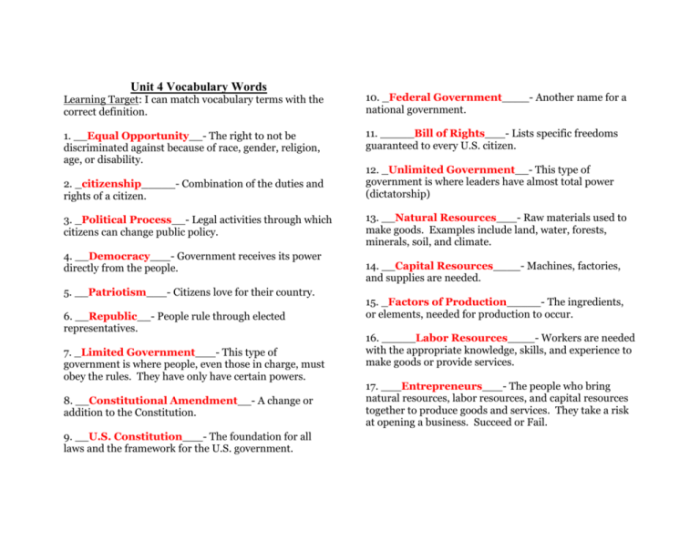Icivics government and the economy answers key – Welcome to the ultimate guide to ICivics Government and the Economy! This comprehensive answer key provides an in-depth understanding of the intricate relationship between government and the economy, empowering you to navigate complex economic concepts with ease.
Our expert team has meticulously crafted this resource to cover a wide range of topics, including the role of government in the economy, market intervention, business regulation, public goods provision, income distribution, and economic stability. With clear explanations and insightful analysis, this answer key will illuminate the fundamental principles that shape our economic landscape.
Understanding the Role of Government in the Economy
Governments play a crucial role in shaping economic activity through various policies and interventions. They influence the allocation of resources, promote economic growth, and ensure stability within the market.
Governments implement fiscal policies, such as adjusting tax rates and government spending, to stimulate or contract the economy. They also utilize monetary policies, such as setting interest rates and managing the money supply, to influence inflation, investment, and economic growth.
Government Intervention in the Market

Governments intervene in the market to address market failures and promote economic efficiency. Market failures occur when the market fails to allocate resources optimally, leading to inefficiencies or inequities.
- Externalities: Costs or benefits imposed on third parties not involved in the market transaction.
- Public goods: Goods that are non-excludable and non-rivalrous, making them difficult to provide privately.
- Natural monopolies: Industries where economies of scale are so significant that only one firm can operate efficiently.
- Information asymmetry: Situations where one party has more information than the other, leading to market inefficiencies.
Government interventions can include price controls, subsidies, taxes, and regulations to correct market failures and improve economic outcomes.
Government Regulation of Business
Governments regulate businesses to protect consumers, promote competition, and ensure economic stability. Regulations can take various forms, including:
- Health and safety regulations: To ensure products and services meet minimum safety standards.
- Environmental regulations: To protect the environment from harmful business practices.
- Antitrust laws: To prevent monopolies and promote competition.
- Consumer protection laws: To protect consumers from fraud, deceptive practices, and unsafe products.
Government regulation can impact businesses by increasing costs, limiting flexibility, and creating barriers to entry. However, it can also foster innovation, improve product quality, and protect consumers.
Government Provision of Public Goods and Services: Icivics Government And The Economy Answers Key

Public goods are essential goods or services that the private market fails to provide adequately. These goods are non-excludable (everyone can benefit from them) and non-rivalrous (one person’s consumption does not diminish another’s).
- National defense
- Public parks
- Education
- Healthcare
Governments provide these goods and services through taxation and public spending, ensuring their availability to all citizens.
Government and Income Distribution
Income inequality refers to the uneven distribution of income within a society. Governments can address income inequality through various policies:
- Progressive taxation: Taxing higher earners at a higher rate than lower earners.
- Minimum wage laws: Setting a minimum wage to ensure a basic level of income for low-wage workers.
- Social welfare programs: Providing financial assistance, healthcare, and other benefits to low-income individuals and families.
Policies aimed at reducing income inequality may have trade-offs with economic growth, as they can disincentivize investment and entrepreneurship.
Government and Economic Stability

Governments play a vital role in promoting economic stability. They implement macroeconomic policies to manage economic fluctuations and prevent recessions and depressions.
Monetary policy, managed by central banks, involves controlling the money supply and interest rates to influence inflation, investment, and economic growth. Fiscal policy, implemented by governments, involves adjusting government spending and taxation to stimulate or contract the economy.
Balancing economic growth with price stability is a key challenge for governments, as excessive inflation or deflation can harm the economy.
FAQ
What are the primary ways in which governments influence economic activity?
Governments primarily influence economic activity through fiscal policy (taxation and spending) and monetary policy (control of interest rates and money supply).
Why do governments intervene in the market?
Governments intervene in the market to address market failures, such as monopolies, externalities, and information asymmetries.
What are the different forms of government regulation of business?
Government regulation of business includes price controls, entry and exit barriers, and environmental regulations.